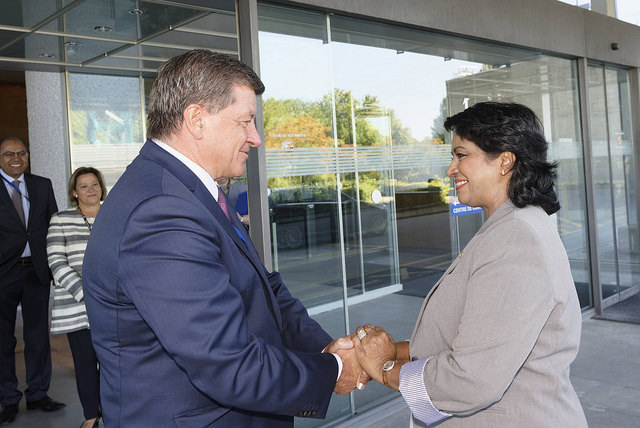The International Labour Organisation (ILO) launches on Monday 21 August 2017 a high-level Global Commission on the Future of Work initiative.
Two serving heads of state or government co-chairing the Commission: Ameenah Gurib-Fakim, President of Mauritius, and Stefan Löfven, Prime Minister of Sweden will chair the commission.
The Commission brings together some 20 experts from all over the world. It is being set up under the ILO’s Future of Work Centenary Initiative launched by ILO Director-General Guy Ryder in 2013. The experts will produce an independent report that will be submitted to the Centenary Conference of the ILO in 2019.
The global body is expected to address the many critical issues of our time and of the future that are rooted in the world of work. It will tackle the fundamental question of how a rapidly transforming world of work should be organised so that it responds to the values of social justice.
Gurib-Fakim and Löfven said work is the foundation for people and societies to grow. “With a decent income, work can pave the way for broader social and economic advancement, strengthening individuals, their families and communities,” said the two leaders.
Yet technology, demography, climate change and globalisation are transforming work more quickly, more profoundly and on a greater scale than ever before.These changes have great potential but bring with them uncertainties about the future of work.
“The fear that while some may benefit greatly from these sweeping changes, many will not, has become a major concern, not least at a time when most countries are facing high unemployment. Therefore, we need to support the job-creating potential of the shift to environmental sustainability and a fair and open world trading system, founded on strong values of rights, freedom and solidarity. Globalisation must benefit all. Only people who feel safe in the present can welcome an uncertain future.”
Rather than adopting a wait and see approach, they encouraged stakeholders to think seriously about the future of work that they want and how to get there. That is because of the fact that the future is not pre-determined and can be influenced by the societal choices and policies that people make.
“To generate ideas and solutions for addressing these fundamental work-related challenges, we have agreed to co-chair the new Global Commission on the Future of Work launched (today) by the International Labour Organisation (ILO). This Commission, which is part of the ILO’s Future of Work initiative, brings together eminent thinkers and practitioners from around the world. It will report to the ILO’s member states in 2019.
“This initiative is, indeed, a truly global effort – over 100 countries have held national dialogues, with governments, employers and workers, to elaborate on approaches to meet the future challenges in the labour market. The contribution of the Commission will also be an important part of the follow-up to the landmark 2030 Agenda on Sustainable Development. Goal eight, in particular, entails promoting inclusive and sustainable economic growth, full and productive employment, and decent work for all.”
For almost a century, the ILO has made a significant contribution to making the world of work a much better place. It has done this by bringing together representatives of governments, workers and employers to promote social justice.
By recognising that the future of work is ours to create, rather than one imposed by forces which we are powerless to control, the two leaders said they were convinced that the future holds a powerful message of hope.
“We are committed to leading this Global Commission in that spirit, and to focus on concrete solutions, policy advice and best practices, with the goal of making the future of work, a future that includes everyone.”






